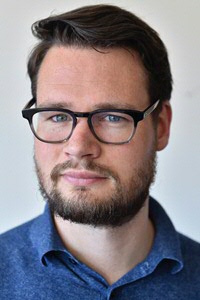Powerful parties determine view of past on social media
It is the users with the most experience and authority who decide how important stories take root on online platforms. Mainstream media, for example, make the most visible and lasting films on YouTube, and a handful of editors on Wikipedia prevent other users from rewriting parts of the story. PhD student Rik Smit studied memory work on Facebook, Wikipedia and YouTube. Rik Smit will defend his PhD thesis at the University of Groningen on Thursday 29 March 2018.

Smit investigated how ‘old’ and ‘new’ actors approach news stories, paying specific attention to mutual power relationships. Online platforms together form an ecosystem in which stories emerge from a continuous stream of updates and versions. As the underlying events slowly become history, both journalists and individual users are constantly reinterpreting this ‘memory work’. ‘I deliberately use the word ecosystem because of the continuous rewriting that takes place’, says Smit. ‘The term landscape is too static for what is happening online given that certain versions of the past dominate others.’
Smit studied the development of three news stories on three online platforms, focussing on three case studies in particular: a chemical weapons attack on Gouta near Damascus in 2013 on YouTube; the death of Michael Brown in St. Louis in 2014 on Facebook; and the shooting down of flight MH17 over Ukraine in 2014 on Wikipedia. The result? The stream of initially chaotic information stabilized, although not in the same way and not at the same rate.
YouTube and poison gas
With the Gouta case study from 2013, Smit determined which witness videos became popular and which were forgotten. What emerged was that the framing and interpretation of the witness stories was done by other users. In addition, journalists from traditional media turned out to be the most successful at creating visual stories that retained good visibility on YouTube, and in the end only 29% of the most popular films were made by eye witnesses.

Facebook and Mike Brown
The study of the Facebook page Justice for Mike Brown revealed how this platform's mechanism contributed to popularizing mainly the simple elements of the story. Forther, it was mainly due to the interaction between the page administrators and the generally activist users that the Brown story stabilized. In addition, Facebook’s personalization structure quickly turned the emotional story into the public story as this platform always stresses people and the personal.
MH17 and Wikipedia
The same effect was even more visible on Wikipedia, where a handful of editors with additional rights ultimately determined which story became the story about the flight shot down on its way to Malaysia, by preventing others from changing the content of lemmas, among other things. Based on the discussions between wiki editors, Smits concluded that these editors also favoured Western sources. The outcome is striking because Wikipedia claims to be an open platform for and by users. In practice, however, story formation is determined by a strict hierarchy and sense of community.
Memory Work
Based on these studies, Smit concluded that hierarchies quickly arise among users of online platforms, after which authority within that community determines which story survives. It is important to note, however, that the differences in technology and user culture are decisive for the exact way in which this takes place. Smit: ‘People and technology both contribute to that effect in the online memory ecosystem.’
More information
- Rik Smit will defend his PhD thesis ‘Platforms of Memory. Social Media and Digital Memory Work’ at the University of Groningen on Thursday 29 March 2018. His supervisors are Prof. Marcel Broersma and Dr Ansgard Heinrich. Pieter Hendrik (Rik) Smit (Groningen, 1986) graduated from the University of Groningen in American Studies and Journalism. He has been Assistant Professor on the Media Studies degree programme at the University of Groningen since November 2017.
- Contact: Rik Smit
More news
-
18 November 2025
What about the wife beater? How language reinforces harmful ideas
-
03 November 2025
Menopause in perspective: How the media influences our perception
-
23 October 2025
Nine UG researchers awarded Vidi grant
